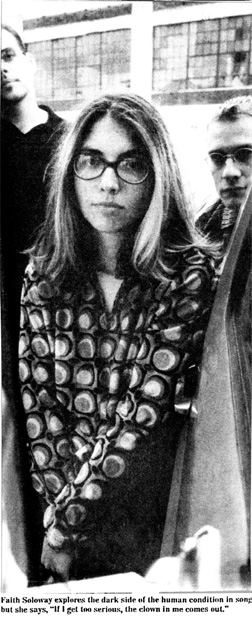Songs of the dark side
- with a light touch
By Scott Alarik
People who hate modern folk music often have the same complaint. These young songwriters are so serious, they say, so introspective and self-important, Is there some kind of rule against having a sense of humor! This is not new. In the 1970s, folk purists sneeringly dismissed the sensitive singer-songwriters of that day as "navel-gazers."
Faith Soloway, a 33-year-old songwriter, is a delightful exception to the often valid stereotype. Though she explores the dark corners of the human condition with a poet's zeal, she also does it with a keen wit and kindhearted empathy that makes her the rarest of artistic creatures, a likable cynic.
"I really do want to be entertaining," Soloway said. "Life is about keeping the balance tipped OK. What makes you happy is important, but so is what makes you sad. I'm afraid to write a song that's too happy, because I don't feel that way. So if a song is going that direction, I connect it with what is still sad and scary underneath. And then, if I get too serious, the clown in me comes out."
Soloway cut her teeth in the street-tough Chicago theater scene. She was musical director of Second City, the legendary comedy improv troupe that spawned such comedy giants as John Belushi, Bill Murry and Gilda Radner.
With her sister, Jill, she wrote a playful farce of the "Brady Bunch" TV show in 1990, which spawned the camp revival of the corny sitcom, culminating in two recent hit movies. They toured the country with their "Real Live Brady Bunch" cabaret satire. In 1993, the show played at the Charles Playhouse in Boston, though by then, Soloway had left and was living in Los Angeles in the futile hope of reaping great rewards from her hit show.
'When the movie started happening," she said, "it went from them talking about us directing it to being in it to maybe we could help cater it, all in about a month. We ended up just being contributors to the script. But we never expected any of it. We just did it to have fun and, all of a sudden, reporters were asking us our views on the 70s and family dynamics and why the show was so popular. And I think we were just these two Jewish girls wanting to be in a big gentile family that had family meetings and potato sack races."
A budding romance and a desire to take a shot at songwriting brought her to Cambridge in 1994. In her five-song CD "Training Wheels," a preamble to a Lyric Moon recording due in March, she teases her native Chicago for its muscle-bound pretensions, and captures the edgy paranoia of urban life in the serio-comic "She Just Works There." She ridicules new-age double-talk and the obsessive consumer culture in a hilarious yard-sale vignette that compares favorably to vintage Lily Tomlin and Whoopi Goldberg.
Soloway's ballads are keenly aimed cultural lampoons. As in Tomlin and Goldberg's best work, though, bubbling beneath the surface is a sad isolation that creates affection for the character, then sympathy, and finally, a recognition that we are seeing ourselves and the darker aspects of our culture reflected in her antics. Even as we laugh, we are moved.
"l love Whoopi Goldberg and Lily Tomlin and Gilda Radner," said Soloway. These people might be a little bit more heroines to me than Joan Baez or Joni Mitchell. I was a theater major, but I was not a good actor. I just wasn't one of those people who could cry, who could drink coffee and make it look hot. I figured out that was because the music came first for me. When I sing about the woman in the yard sale, I feel more connected to her than I ever did in theater, and it's because I'm combining all the things that are real for me: being in front of an audience, playing music, and being a bit of a clown. With my music around me, I can be an actor."
Soloway appears Nov. 13 at the Attic in Newtan Center, Dec. 16 at Ryles in Cambridge, Dec. 19 at Club Passim, also in Cambridge, and Dec. 20 at Tallulah's in Davis Square.



